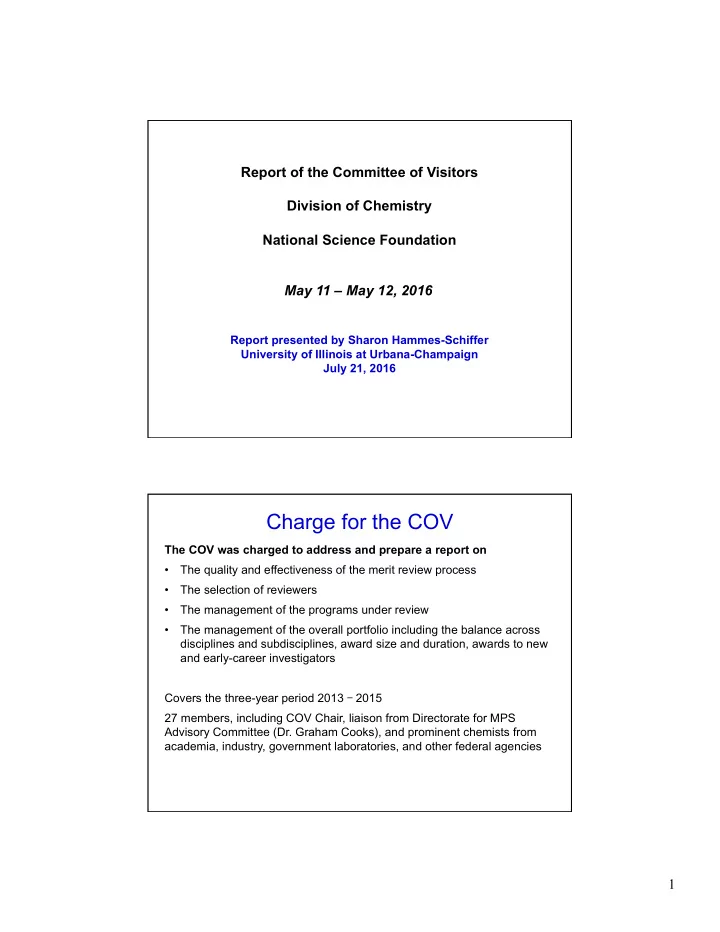

Report of the Committee of Visitors Division of Chemistry National Science Foundation May 11 – May 12, 2016 Report presented by Sharon Hammes-Schiffer University of Illinois at Urbana-Champaign July 21, 2016 Charge for the COV The COV was charged to address and prepare a report on • The quality and effectiveness of the merit review process • The selection of reviewers • The management of the programs under review • The management of the overall portfolio including the balance across disciplines and subdisciplines, award size and duration, awards to new and early-career investigators Covers the three-year period 2013 - 2015 27 members, including COV Chair, liaison from Directorate for MPS Advisory Committee (Dr. Graham Cooks), and prominent chemists from academia, industry, government laboratories, and other federal agencies 1
12 CHE Programs Reviewed • CAT: Chemical Catalysis • CMI: Chemical Measurement and Imaging • CTMC: Chemical Theory, Models and Computational Methods • CSDM-A: Chemical Structure, Dynamics and Mechanisms A • CSDM-B: Chemical Structure, Dynamics and Mechanisms B • CLP: Chemistry of Life Processes • EDU: Research Experiences for Undergraduates Program and other Educational Activities • ECS: Environmental Chemical Sciences • INSTR: Major Chemical Research Instrumentation and Facilities • MSN: Macromolecular, Supramolecular and Nanochemistry • SYN: Chemical Synthesis • CCI: Centers for Chemical Innovation COV Process The COV process occurred via the following steps • Video teleconferences in April for presentations, tutorial, and briefings • COV meeting began with overviews and briefings on conflicts of interest • COV members separated into 12 subpanels for the different areas • Primary and secondary reviews of proposal jackets, many discussions • COV met to discuss general recommendations and emerging themes • Merged subpanel reports and prepared global draft report • Presented findings and recommendations 2
Recommendation #1 Advocate additional funding for the Chemistry Division overall and maintain focus of existing funds on high-impact fundamental research • Highest priority should be to fund the best fundamental research and transformative science with broad impact • Many strong proposals are not funded or have severe budget cuts • Ensure that grant sizes are large enough to enable fundamental and transformative research Recommendation #2 Enhance transparency of the reviewing and decision processes • The reviewing and decision processes must be transparent to maintain the trust and support of the community • Program Officer Comments should include allowable part of Review Analysis to provide written input to PIs on declinations • Consistent and effective use of panels facilitates transparency • Clarification of assessment, weighting, and accountability of broader impacts 3
Recommendation #3 Broaden the representation of proposals funded across types of institutions and principal investigators • Wide range of perspectives is essential to tackle global issues and exert significant impact on society • Continue efforts and create new mechanisms to increase number of submitted proposals from different types of PUIs and PhD granting institutions, as well as from URMs and women • Recognize heterogeneity among institutions and PIs in solicitations and reviewing processes Review Process • Overall efficacy and quality of merit review process is outstanding • Consistent and effective use of panels, both virtual and in-house, is key • Program Officers should provide instructions to use full range of rankings and to take into account heterogeneity among institutions • Clarification of assessment, weighting, and accountability of broader impacts • Program Officers should transmit Review Analysis in writing to PIs 4
Reviewer Selection • Overall selection of qualified reviewers with balance across gender, institution type, and career stage is excellent • Continue to develop an effective reviewer database and also utilize publication databases to identify suitable reviewers • Utilize a combination of mail-in and panel reviewers Program Management and Portfolio • Overall program management by the Program Officers is admirable • Ensure effectiveness and continuity of Program Officers: mix of experienced permanent ones and rotators, cross-training important • Resulting program portfolios are impressive • Continue to focus on supporting fundamental research and transformative science • Develop additional mechanisms to broaden participation 5
Contributions to Strategic Goals of Division and Foundation • Maintain focus on core mission of fundamental research in chemistry • Centers for Chemical Innovation have been highly successful in promoting synergy but should continue to be assessed to ensure that the outcome of the center is greater than the sum of the parts • The educational impact of NSF programs is high • The impact of NSF funding on instrumentation is high and must be maintained • The COV recommends that NSF continue and expand support of international and industrial collaborations Response of Division to 2013 COV Report • Eight recommendations were made by the 2013 COV • The COV assessed the Chemistry Division’s response to each one • Overall, the response from the Division has been appropriate • In certain cases, such as improving transparency, clarifying broader impacts, and fostering international and industrial collaborations, progress has been made but further efforts are warranted 6
Concluding Remarks • The COV commends the Chemistry Division for a high level of success in funding high-quality fundamental research • The Program Officers are doing an admirable job with the review process, as well as program management and portfolio • The Division has successfully contributed to the strategic goals of the Division and Foundation • Further progress can be made in terms of ensuring transparency and broad participation, while maintaining funding of high-impact, fundamental, transformative research Many Thanks! Dr. Fleming Crim, Assistant Director for Mathematical & Physical Sciences Dr. Angela Wilson, Chemistry Division Director Dr. Carol Bessel, Deputy Division Director for Chemistry Dr. Eduardo Misawa Outstanding NSF Program Managers and Staff! Terrific COV Members! 7
Recommend
More recommend